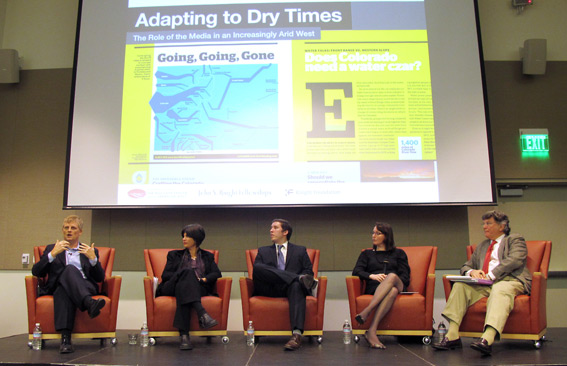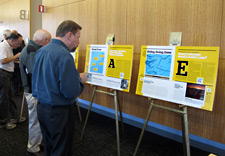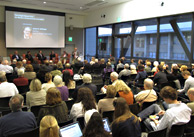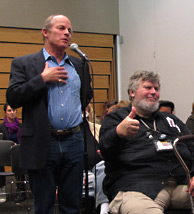
The Bill Lane Center for the American West, Stanford University

2012 Knight-Risser Prize Symposium
The Challenge for Journalists: Engage Readers on Complex Water Issues
John S. Knight Fellowships
The journalists who won the 2011 Knight-Risser Prize for Western Environmental Journalism follow a long tradition of writers hoping to educate and stir citizens to take interest in something most take for granted – water. Today, they also represent a vanguard of journalists finding new ways to grab public attention and understanding.
At an annual symposium at Stanford University, Patrick Doyle and Natasha Gardner, winners of the $5,000 prize for their story "Dry Times" in Denver's 5280 magazine, joined KQED's Sasha Khokha in a discussion on "Adapting to Dry Times: The Role of the Media in an Increasingly Arid West." Khokha was part of a reporting project that received the judges' Special Recognition.
Also on the panel was Andrew Fahlund, executive director of the Water in the West Initiative of the Bill Lane Center for the American West, which along with the John S. Knight Journalism Fellowships at Stanford sponsors the annual prize and symposium. The panel moderator was David M. Kennedy, faculty co-director of the Bill Lane Center.
Complete Video of the Symposium (Story continues below)
Distilling a Complex Story Through Infographics
Doyle and Gardner's challenge, they said, was to distill a complex story of geography, history, and land-use policy into a report that would get readers interested and involved. The solution was an imaginative use of graphics and a tight but well-researched narrative that prize judges felt brought Colorado's water dilemma to life. And it got high marks for accuracy and thoroughness.
"We could have written 10,000 words, but what we did was much more relatable," said Doyle.
Gardner described how in an unusual collaboration with their graphic artist, the two reporters carefully penciled the detailed drawings that would illustrate the key issues. "In this case, illustrations became word," she said.
Kennedy asked what they felt was the greatest public misconception about water.
"Water is so cheap, people never think about how much it costs to get it to them, the engineering feats needed," said Gardner.
 "Dry Times" opens with a two-page graphic showing that most of the rain feeding the Rocky Mountain rivers Denver depends on for water falls to the west of the Continental Divide. Eighty percent of the population lives to the east. So water has to be pumped up and over.
"Dry Times" opens with a two-page graphic showing that most of the rain feeding the Rocky Mountain rivers Denver depends on for water falls to the west of the Continental Divide. Eighty percent of the population lives to the east. So water has to be pumped up and over.
"It's a remarkable mosaic of the issue of fresh water in the West. It touches on virtually every major aspect we currently face,'' said Fahlund.
A Complex, Multiplatform Collaboration for KQED and California Watch
Khokha's challenge was helping to coordinate a project, "Nitrate Contamination Spreading in California Communities," that included newspaper distribution, radio broadcasts and myriad web components including text, video, slide shows, and interactive graphics. The Central Valley Bureau Chief for KQED Radio's California Report, Khokha developed the story in collaboration with the nonprofit California Watch, the journalist Julia Scott and the independent filmmaker Christopher Beaver. "It was a lot of juggling and figuring out this new dance, this new collaboration," she said. In addition, she said, they learned that multiple visits and special sensitivities were required for sources who felt "bombarded."
Video and radio, she said, brought an intimacy to an investigation into fertilizer contamination in Central Valley water, through the faces and voices of farmworkers barely able to afford the vegetables they pick having to pay for drinking water.
Fahlund applauded their reach into what might be considered a fairly esoteric matter, but one especially important for rural communities around the state.
Scott's stories appeared in print and online for the San Francisco Chronicle, papers belonging to the Bay Area News Group, the Riverside Press Enterprise, the Visalia Times Delta and the Tulare Advance Register. Khokha's radio reports were broadcast on KQED and Beaver's video segments appeared exclusively on www.californiawatch.org.
Knight Fellowships Director Jim Bettinger said journalists today must be fluent in several media while understanding that each has its own strengths and weaknesses. "You need to be able to work in all of them to tell a complete story."
Complete Audio: Knight-Risser Symposium, Jan. 25, 2012
Duration: 1 hour, 4 minutes (download as podcast)
Knight-Risser Prize Symposiums:
“When the Well Runs Dry: Confronting a Groundwater Crisis” 

January 2017 Knight-Risser Prize Symposium, January 25, 2017
“Breathless in Texas: Energy Production Puts Air at Risk” 

2016 Knight-Risser Prize Symposium, February 17, 2016
“Troubled Waters: Marine Life and the Threat of Ocean Acidification” 

2015 Knight-Risser Prize Symposium, February 25, 2015
“Deadly Measures: Uncovering a Little-Known Agency's Toll on Wildlife” 

2014 Knight-Risser Prize Symposium, February 5, 2014
“Wildlife, Wired: How Technology Is Changing Nature Reporting” 

2013 Knight-Risser Prize Symposium, February 20, 2013
“Adapting to Dry Times: The Role of the Media in an Increasingly Arid West ” 

2012 Knight-Risser Prize Symposium, January 25, 2012
“The Crisis in Western Environmental Journalism” 
November 2010 Knight-Risser Prize Symposium, November 17, 2010
“Visualizing the Environment” 
January 2010 Risser Prize Symposium, January 27, 2010
“Climate Change Hits Home”
December 2008 Risser Prize Symposium, December 3, 2008
“Environmental Fallout of the Cold War” 
March 2008 Risser Prize Symposium, March 13, 2008
“Water in the West: 21st Century Challenges in a 19th Century Legal Framework” 
2005 Risser Prize Symposium, November 1, 2005
“You have to get over the color green; you have to quit associating beauty with gardens and lawns; you have to get used to an inhuman scale; you have to understand geological time.”


“Colorado is a state of transplants, where just about everyone waters their lawns. What does that say, that you can't have a lawn without some kind of intervention? Maybe lawns are not really proper in this environment.”
Texas Tribune, ProPublica

The Desert Sun and USA Today

CPI, InsideClimate News, The Weather Channel

The Seattle Times

The Sacramento Bee

High Country News

5280 Magazine

Seattle Post-Intelligencer

What Went Wrong?
The Seattle Times

San Antonio Express-News

The Los Angeles Times

High Country News



